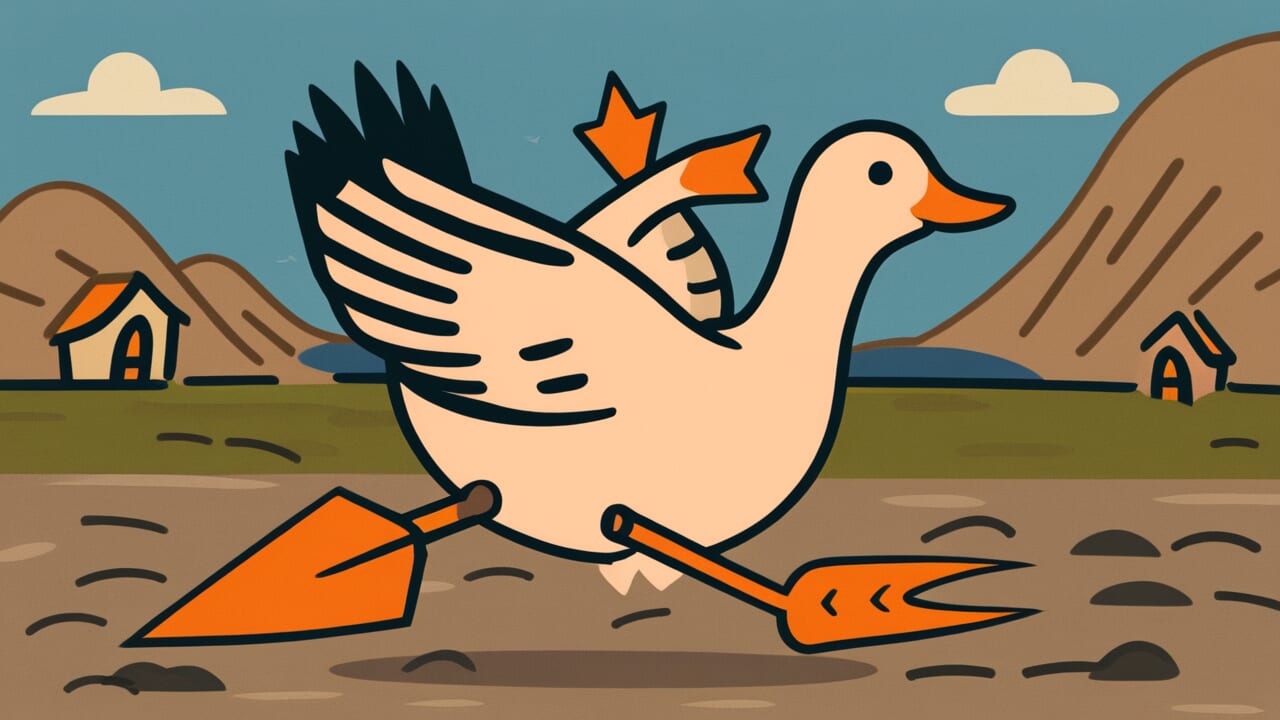How to Read “A wild goose costs eight hundred, an arrow costs three mon”
Gan wa happyaku, ya wa sanmon
Meaning of “A wild goose costs eight hundred, an arrow costs three mon”
“A wild goose costs eight hundred, an arrow costs three mon” means it’s not worth losing something valuable by using cheap tools.
The proverb warns against the foolishness of using inadequate or cheap methods to pursue valuable goals or targets.
This saying applies to situations where short-term savings or stinginess lead to bigger losses.
For example, it points out when someone neglects preparation for an important business meeting, or uses poor-quality tools for crucial work.
Today, people understand it as a warning against failing to invest where investment is needed.
The teaching connects to “penny wise, pound foolish,” but more specifically shows the practical wisdom that “to obtain something valuable, you should prepare appropriate means.”
It’s an expression that captures the essence of cost-effectiveness: if you seek great results, you need corresponding preparation and investment.
Origin and Etymology
No clear written records of this proverb’s origin seem to remain, but the structure of the phrase reveals an interesting background.
Wild geese are migratory birds that have been treasured in Japan since ancient times as valuable food.
Geese that arrived from autumn to winter especially held high value as hunting targets for samurai and nobles.
The number “eight hundred” likely expresses “extremely expensive” rather than an actual price.
“An arrow costs three mon” uses “three mon” as an idiom meaning a very small amount of money.
In Edo period currency values, three mon was truly a tiny sum. Arrows were consumable items that would be lost or damaged once shot.
This proverb likely originated from hunting scenes.
If you try to shoot down a valuable wild goose with a cheap arrow and fail, you lose the arrow and the goose escapes.
The result is losing great value because of a minor tool. This lesson contains the teaching about the importance of cost-effectiveness and calculating gains and losses.
From practical hunting experience, this wisdom about cost-effectiveness likely spread among people.
Usage Examples
- You’re about to land a major client, but making the presentation materials yourself to save money is like “a wild goose costs eight hundred, an arrow costs three mon”
- The exam fee is expensive, so if you skimp on reference books and fail, that’s “a wild goose costs eight hundred, an arrow costs three mon”
Universal Wisdom
The proverb “A wild goose costs eight hundred, an arrow costs three mon” reflects a fundamental human contradiction.
We all desire great results while simultaneously hesitating over small expenses right in front of us.
Why do people hesitate to make small investments when facing something valuable?
It’s because the pain of costs leaving our hands feels stronger than the joy of gains we haven’t yet obtained.
The pain of losing a three-mon arrow exists here and now, while the joy of obtaining an eight-hundred-mon goose remains uncertain in the future.
Humans tend to be captivated by visible things and underestimate invisible value.
This proverb has been passed down through generations because this human nature never changes across time.
In every era, people trapped by immediate savings have missed big opportunities.
Our ancestors saw through this human weakness and left this lesson using the clear metaphor of hunting.
Truly wise living means having the balanced sense to invest generously in valuable things while not clinging to trivial matters.
This proverb continues to ask us about such life wisdom.
When AI Hears This
The moment a three-mon arrow is shot, a remarkable cognitive shift occurs in the human brain.
According to Kahneman’s prospect theory, humans feel the pain of loss about 2.25 times more strongly than the joy of gain.
This means even a small investment of three mon feels like losing more than six mon in value.
So the archer becomes dominated by the emotion “I don’t want to waste three mon” and cannot make the rational decision to pursue the eight-hundred-mon goose.
Even more interesting is the asymmetry in decision-making before and after shooting the arrow.
Before shooting, you can calmly judge by expected value: “A three-mon investment might yield eight hundred mon.”
But after shooting, the three mon becomes a sunk cost—an unrecoverable expense.
Then the brain extremely dislikes confirming the loss, thinking “If I give up now, the three mon becomes completely wasted,” and chooses to keep chasing.
Behavioral economics experiments show about 87 percent of subjects fall into this trap.
Humans unconsciously incorporate “costs already paid” into future decision-making.
What’s frightening about this proverb is that by showing the specific small amount of three mon, it recognizes how even tiny investments have the power to drive humans to irrational behavior.
Lessons for Today
This proverb teaches modern people the importance of having eyes to recognize when to invest.
In modern society, we face choices in every situation.
Learning for skill development, investment in health, time and money to deepen relationships—all these have the structure of immediate costs versus future value.
Course fees for certification, purchase costs for quality tools, consultation fees for experts.
The moment you feel these expenses are “wasteful” is exactly when you should remember this proverb.
What matters is distinguishing what is “the eight-hundred goose” and what is “the three-mon arrow.”
What is truly valuable to you? Are you ruining the investment needed to obtain it through immediate savings?
Of course, this doesn’t recommend wasteful spending.
However, when pursuing something valuable, you need appropriate preparation and investment.
What you should begrudge is wasteful spending; what you shouldn’t begrudge is investment in the future.
To not miss the “goose” in your life, have the courage to invest without hesitation in the necessary “arrows.”



Comments